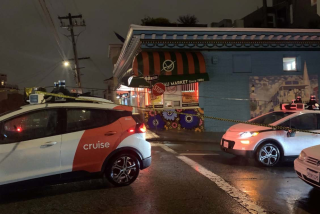Legislation for More Stringent Testing of Tires Is Weighed
- Share via
WASHINGTON — Congressional investigators are now focusing on whether Ford and Firestone adequately tested the tires for the Explorer sport-utility vehicle. The tires were recalled last month amid growing evidence they could fail and cause deadly rollover crashes.
With hearings on the testing issue scheduled for Thursday before the House Commerce Committee, lawmakers are considering legislation to require more stringent tire testing.
“We want to know who tested what, when and under what conditions,” said Rep. W. J. “Billy” Tauzin (R-La.), who is heading the House investigation. “If they were not required to test under realistic conditions, we’ve got to change that.”
Investigators believe that better testing might have detected the flaw that caused tires to separate. They are particularly interested in how extensively the tires were tested at a lower inflation pressure that Ford set for the Explorer.
Firestone recommended that the tires be inflated to 30 pounds per square inch, but Ford, concerned about the Explorer’s stability, specified a pressure of 26 psi.
At a lower pressure, a tire would experience somewhat greater friction and build up more heat. That, in turn, could hasten the emergence of any previously undetected defect, some investigators believe. Heat is thought to be a factor in Firestone tire tread separations, since most of the accidents have occurred in hot weather.
Firestone told a Senate committee this week that it had not tested the tires at the lower 26 psi because Ford was supposed to do it.
“Firestone did not conduct any high-speed testing of . . . tires at 26 psi prior to the introduction of the product line in conjunction with the Explorer,” the company said in papers submitted to the Senate Commerce Committee. “It was Firestone’s understanding that Ford conducted testing . . . and that Firestone would be notified if there were any problems.”
Firestone Vice President John Lampe also testified that the company now believes the lower inflation pressure may have reduced the tire’s margin of safety.
However, Lampe acknowledged at the hearing that the main problem appears to be a design defect in some of Firestone’s tires, coupled with quality control deficiencies at its Decatur, Ill., plant, where many of the 6.5 million recalled tires were manufactured.
Ford spokeswoman Sara Tatchio said the company tested the tires at 100 mph for 200 miles at 26 psi.
“It was a normal sign-off test before the vehicle was OKd for production,” Tatchio said. “There were no issues. [The tires] passed the test.”
Tatchio was unable to provide any further details on the testing, but the company is turning over the documentation to House investigators.
Ford has strenuously disputed any suggestion that its 26 psi recommendation could have compromised the safety of the tires. Goodyear tires inflated to 26 psi on 500,000 Explorers have not experienced similar problems, according to Ford. Other SUV manufacturers, such as Nissan and Toyota, also recommend 26 psi for some of their models.
Tire testing is usually done under laboratory conditions, using machines that simulate the loads a tire would experience on a vehicle. But lawmakers want to find out whether the lab tests accurately reflect the conditions a motorist would encounter in a Ford Explorer loaded down with family possessions driving down the freeway on a hot day.
Sean Kane, a litigation consultant who helped bring the Firestone tire problems to light, said more testing would have been a good idea.
“You test for two hours on a new tire--so what?” Kane said. “This is a tire that has a tread life of 80,000 miles.”
However, Kane said he doubts that Ford’s 26 psi recommendation is the main reason the tires failed. “It may be a contributing factor, [but] there is really no one smoking-gun here. It’s a confluence of a lot of different issues.”
In another development, the Tennessee attorney general’s office said Friday that it is investigating reports that some used-tire dealers are selling recalled Firestone tires. Once purchased, the recalled tires could be traded by customers for free brand-new replacements under Bridgestone/Firestone’s recall program.
Sharon Curtis-Flair, a spokeswoman for the Tennessee attorney general, said several states are talking with Bridgestone/Firestone about the matter. She said she could not comment on how widespread the practice might be.
Seattle TV station KIRO reported Thursday that it was able to purchase the recalled tires from several used-tire dealers. At least one dealer said people could buy the used tires cheaply and then go to a Firestone dealer to get the replacements.
*
Times wire services contributed to this story.






